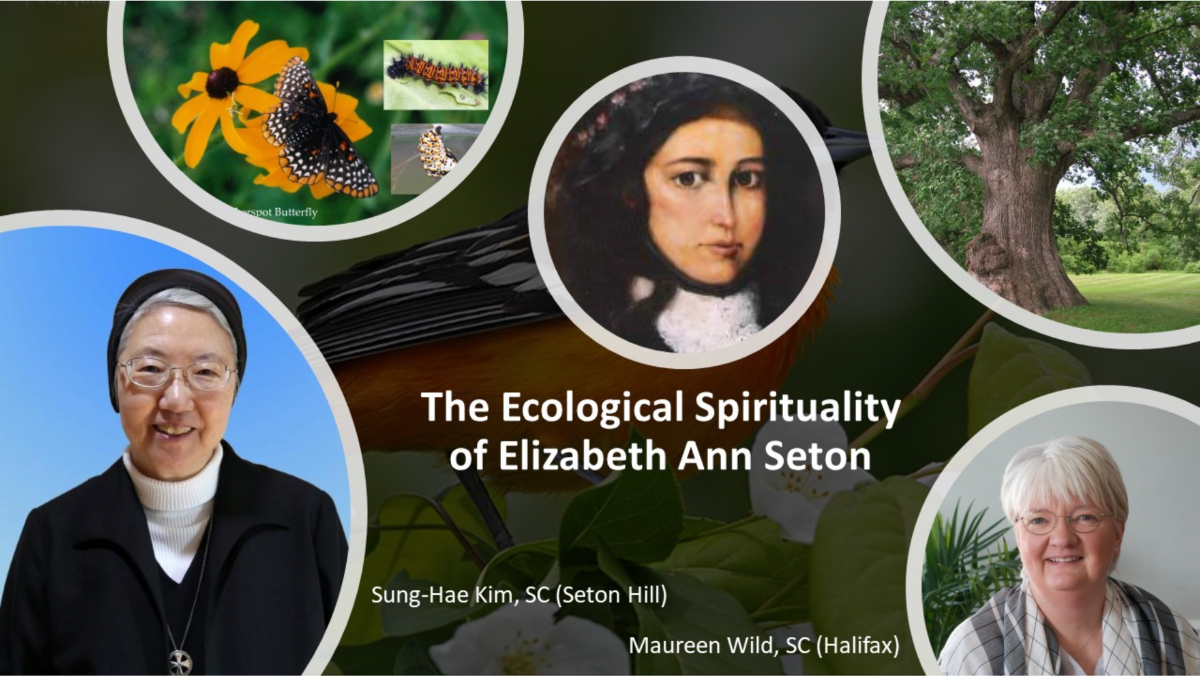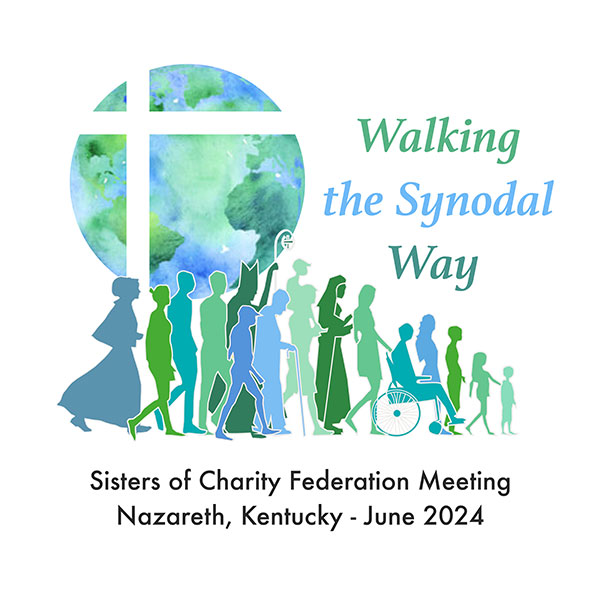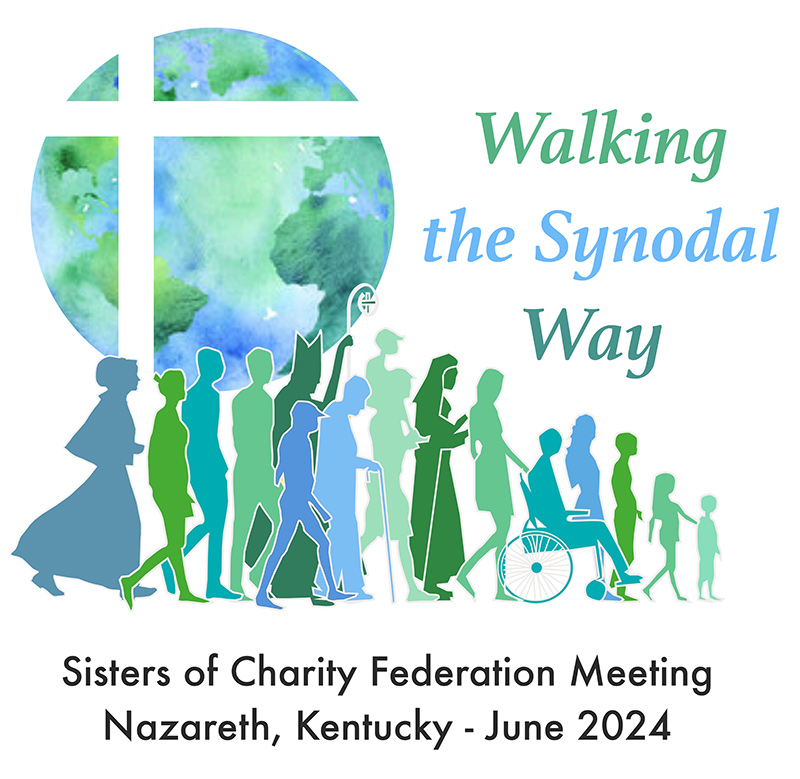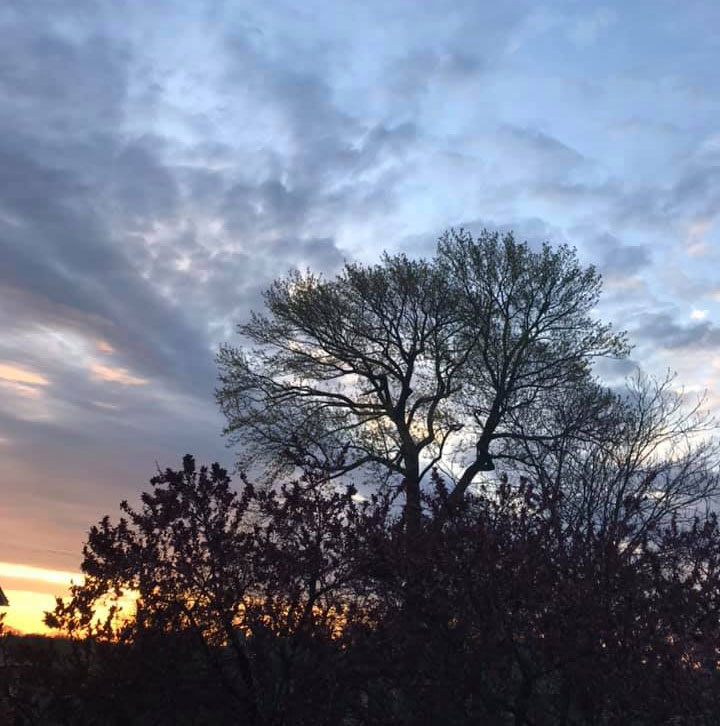
Sister Teresa posted this photo on Facebook on April 25, with the comment: “In troubled times | Look for a ray of hope | Hidden behind the clouds.”
Sister Teresa Kotturan, SCN, is the NGO representative at the UN for the Sisters of Charity Federation. This was written on April 22 from her apartment in the Bronx.
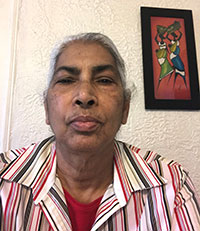 Living in New York during the COVID -19 pandemic is a unique experience–a desert experience in a city that never sleeps. Daily news updates indicate New York has become the epicenter of the crisis, with an ever-growing number of infected people and the increasing number of people dying daily. Though physically distanced from people, at the conscious and subconscious level I am impacted by the fears, anxiety, suffering, distress and angst of people all over the world. Living in solidarity with the pain and suffering of the world can be heavy on one’s heart. Stress levels are heightened when one is privileged to accompany friends who are hospitalized to endure the long-drawn treatment modalities which heal some and lead others to eventual death in isolation–without a goodbye from loved ones. Losing a friend recently to the pandemic is part of the painful experience.
Living in New York during the COVID -19 pandemic is a unique experience–a desert experience in a city that never sleeps. Daily news updates indicate New York has become the epicenter of the crisis, with an ever-growing number of infected people and the increasing number of people dying daily. Though physically distanced from people, at the conscious and subconscious level I am impacted by the fears, anxiety, suffering, distress and angst of people all over the world. Living in solidarity with the pain and suffering of the world can be heavy on one’s heart. Stress levels are heightened when one is privileged to accompany friends who are hospitalized to endure the long-drawn treatment modalities which heal some and lead others to eventual death in isolation–without a goodbye from loved ones. Losing a friend recently to the pandemic is part of the painful experience.
How do I navigate my life during these difficult times? It can be described in two words – discipline and structure. Living alone, working from home without going to the office, and interacting with colleagues and collaborators requires schedules and structures. It is an attempt to live each day intentionally and mindfully. It means rising up early, and being present to the Presence within me and around me in contemplation. It is finding joy in the simple things that lifts up one’s being – lighting a lamp, striking the singing bowl, bird songs, watching the new dawn and the offer of new life from God. It also means to lift up to God all who have been a part of my journey and the world in gratitude. Physical and mental health is maintained through a routine of exercises and walks around my apartment.
Journey through Lent, reflections on the Passion of Christ and the Risen Christ brought home the reality, that Christ is suffering with us during this crisis. In fact, Christ is leading me and all the world on a transformative journey. Every crisis demands transformation. While living the now in gratitude, I need to prepare myself for change, for metanoia, a spiritual conversion. There is no going back to business as usual. As we are living in history-making times, I turn to “Laudato Si” to guide me for an ecological conversion and develop a spirituality of global solidarity.
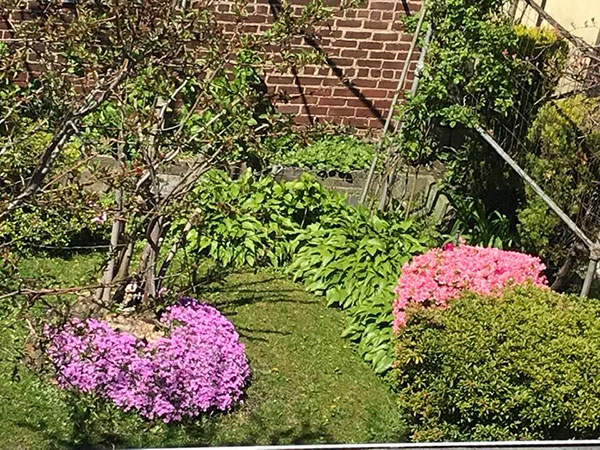
Sister Teresa posted this photo on Facebook on April 28, with the comment: “My neighbor’s garden, from my porch! Beauty abounds everywhere.”
In the midst of social distancing, reaching out to others to create community, solidarity, sense of purpose and well-being, with my sisters, friends and colleagues is part of the daily ritual. Relationships and friendships helps to create meaning to our lives. We are all in this together, and together we can withstand the ravages of the pandemic. Our ability to outlive the pandemic and forge for the new normal depends on our ability to recognize our interdependence and capacity to be people of compassion. Today, it might mean reaching out to touch someone and be strengthened by another virtually. Phone calls, emails and messages from friends and family around the world have been a source of strength in isolation. People are crying out for hope, and I am called to be an instrument of hope alive in the midst of despair.
The decision of the United Nations to cancel/postpone all scheduled meetings in early March impacted the lives of all non-governmental organization representatives working in New York. While forced to work from our homes, we had to figure out new ways of doing advocacy and networking online, in order to challenge the systems of injustice and exploitation for justice, peace, and for the flourishing of the earth and people, especially those living on the margins in our globalized world. As the COVID-19 pandemic crossed borders and devastated lives across the world, we witnessed a tendency among countries to turn inward. The ineptitude with which world leaders responded to the pandemic have exposed existing inequalities and injustices.
Though COVID-19 is an equalizer, vulnerable people, those living in poverty, the homeless, migrants and refugees in temporary shelters, people in slums, and those locked up in the prisons and jails are impacted unequally. The call to self-isolate in confined homes and shelters exposes the vulnerable population to the threat of being infected with no means to seek healthcare and sustenance. The pandemic is having devastating social and economic consequences on women and girls. During the lockdown, women who experienced domestic violence before the pandemic are now trapped at home with their abusers without access to any kind of protection. There has been an increase in reported domestic violence during the pandemic, which could lead to increased homelessness. Nearly 70 percent of all the frontline responders in the health and social sectors, both formal and informal, are women. They are risking their lives to serve the community. Most women do not have the option to self-isolate; they cannot afford to miss work, and if they fall ill, do not receive paid sick leave. Millions of children’s lives are affected during this crisis – without adequate nutrition, tech support to learn online and exposed to domestic violence.
These are the issues that we NGOs are following up through online meetings to urge the UN Member States for the adoption of policy measures and recommendations at the UN and relevant international forums for a global response to the COVID-19 emergency. Beyond the country-specific responses, the UN needs to adopt measures that uphold international cooperation in a true spirit of multilateralism to contain, mitigate and defeat the pandemic.
Sister Teresa posted the video above on Facebook on April 30, with the comment: “An amazing offer | To sing God’s praises | At all times… “
In a short span, our lives have been changed irreversibly. We are living in a fragile world, where our vulnerabilities have been exposed–we have been disarmed. Old narratives will not meet the current challenges. You and I are called to create a new pathway, a paradigm shift at a personal and societal level. Going forward, we need to open up the ocean of compassion and love present in the depth of our being for “an explosion of compassion.” Globalization of economics needs to give way to the globalization of compassion, kindness, understanding and solidarity for the creation of a COMMUNITY OF CARE.

